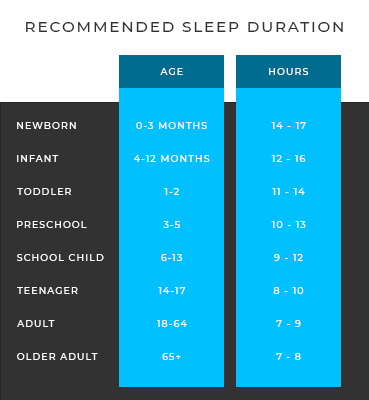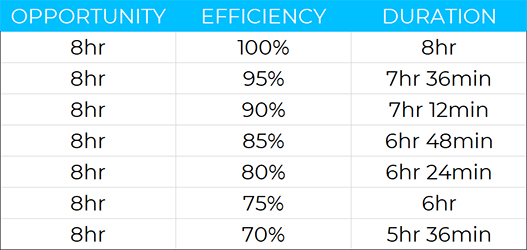We should all be getting 8 hours of sleep, right? Kind of, sort of, yea that’s mostly right depending on your age. It’s a rule of thumb we all understand. So, if I go to bed at 11pm and wake up at 7am then I’ve hit my 8-hour sleep goal, right? Wrong. Today I’m going to explain sleep efficiency, why you’re likely calculating your sleep duration wrong, and why you may need to spend more time in bed. And I’m going to do that all with some fancy charts, fun facts, and maybe a joke or two. Let’s get into it!
Recommended Hours of Sleep
Our sleep duration is the amount of time we spend asleep. And below are the sleep duration recommendations provided by both the CDC and the National Sleep Foundation. Although everyone’s sleep requirements are slightly different, there’s a 99% chance you fall within these guidelines. But there are a few genetic mutations of DEC2, ADRB1, or NPSR1 that allow people to function healthfully on 4-6 hours of sleep. I checked my jean drawer and only found American Eagle though. So, in most cases you don’t have these gene mutations either and will require a sleep duration like the guidelines suggest.
And since I promised some fun facts, one is that most people think the elderly need less sleep (5-7 hours). But their sleep requirements are almost identical to everyone’s over the age of eighteen. The main difference is that many elderly people have lost the capacity to get a full night’s sleep due to poor sleep history, substandard dieting, lack of physical activity, or any number of unhealthy lifestyle choices. Losing the ability to get a full night’s rest obviously accelerates the aging process too.

Sleep Efficiency
So now that we have a promising idea of how many hours we should be sleeping, let’s try to determine our sleep efficiency. In its simplest form, sleep efficiency is how much time you spend asleep relative to how much time you spend in bed.
Sleep Efficiency (SE) = Total Sleep Time (TST) / Time in Bed (TIB)
Example: 7 hours and 36 minutes asleep while spending 8 hours in bed equals a 95% sleep efficiency.
If this was too simple though, scientists have detailed a more specific formula to determine your exact sleep efficiency. This is total sleep time relative to how long it takes you to fall asleep, stay asleep, midnight awakenings, and attempts to sleep again after awakening.
Sleep Efficiency (SE) = Total Sleep Time (TST) / (Sleep Onset Latency (SOL) + Total Sleep Time (TST) + Wake After Sleep Onset but before final awakening (WASO) + Time Attempting to Sleep After Final Awakening (TASAFA))
Detailed Example: 7 hours and 12 minutes asleep while spending 14 minutes to initialize asleep, 27 minutes awake at night, 9 minutes attempting to sleep after awakening in the morning equals a 90% sleep efficiency.
Ok now that that dead pillow has been beaten, many activity trackers will calculate your sleep efficiency for you automatically. But, on average, they’re only about 78% accurate at determining your sleep/wake state. This accuracy is improved in trackers, that also take heart rate into consideration. For example, the Oura ring is one of the most accurate sleep trackers and its sleep/wake accuracy is around 90%. So, even this isn’t going to be completely accurate, which is why I thought it’d be helpful to explain how you can calculate your sleep efficiency yourself as it may be more accurate than a tracker.
And a good target range to shoot for is a sleep efficiency of 86-97% with the optimal range being around 93-95%. Now, if you’re a high achiever looking to ace this test with a 100 then this is a good sign you may be sleep deprived. If you’re the kind of person who falls asleep immediately when your head hits the pillow and you don’t wake until the morning, it’s very possible your body requires more sleep. And if you’re on the lower end below 85%, this could be a sign of a possible sleep issue. And many people with insomnia can reach sleep efficiencies below 75%. So, if you’re anywhere below an 86% sleep efficiency rating then it may be worth checking in with a doctor.

Sleep Opportunity
And now that we understand how to determine our sleep efficiency and what’s a healthy range, let’s recalculate our bedtime routine. At the beginning I mentioned a common miscalculation where many people assume that going to bed at 11pm and waking up at 7am produces 8 hours of sleep. Well, if you’re sleeping optimally at a 95% sleep efficiency, this only generates 7 hours and 36 minutes of sleep. If you’re sleeping sub optimally at 85%, then this only generates 6 hours and 48 minutes of sleep. So, to determine our bedtime routine, we first need to know the duration of sleep we want to get, then we need to know our current sleep efficiency, and only then can we determine the amount of time we need to spend in bed to accomplish this goal. And if the average person has a sleep efficiency of 90%, then they’d need to spend nearly 9 hours in bed to accomplish this.

For me, I’ve been heading to bed at 10:20pm lately and waking up at 6:45am. This provides me with an 8 hour and 25-minute sleep opportunity. I’ve estimated my sleep efficiency at 90% which means I’m getting around 7 hours and 35 minutes of sleep which is within the CDC and Sleep Foundation’s guidelines.
Final Thoughts
A substantial portion of people in the United States are skimping on sleep already. On top of this, many are miscalculating how much sleep they’re getting by not taking into consideration their sleep efficiency. Sleep efficiency can easily be calculated by taking your total time asleep and dividing it by your total time attempting to sleep. Not only will this sleep efficiency rating allow you to properly allocate time for sleep, but it’ll also help you determine if you’re sleep deprived or have sleep issues requiring medical attention. All of this, will help you better understand your sleep for a healthier and happier life.
Would you like my Top 10 Sleep Tips to improve your sleep efficiency?
Watch a YouTube Video Summarizing the Post

Hey, I am Brandon Zerbe
Welcome to myHealthSciences! My goal has always been to increase quality-of-life with healthy habits that are sustainable, efficient, and effective. I do this by covering topics like Fitness, Nutrition, Sleep, Cognition, Finance and Minimalism. You can read more about me here.
Sources:
- How Much Sleep Do We Really Need?
- How Much Sleep Do I Need?
- How to Improve Your Sleep Efficiency
- Measuring Sleep Efficiency: What Should the Denominator Be?
- Sleep Efficiency: What is It, How Do You Stack Up & How Can You Improve?
- A Second Mutation That Makes People Need Less Sleep Has Been Found
- Rare Genetic Mutation Lets Some People Function with Less Sleep
- Agreement Between Actigraphic And Polysomnographic Measures of Sleep in Adults with and Without Chronic Conditions: A Systematic Review and Meta-Analysis
- The Sleep of the Ring: Comparison of the ŌURASleep TrackerAgainst Polysomnography
- A Validation Study of Fitbit Charge 2™ Compared with Polysomnography in Adults
